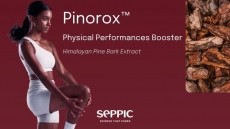‘Clinical relevance’: Polyphenol blend may slash blood pressure in hypertensives

Researchers from the University of Utah, Salt Lake City and Melaleuca Inc., Idaho Falls tested a blend composed of grape seed and skin extract (330 mg per day), decaffeinated green tea extract (100 mg), quercetin dehydrate (50 mg), resveratrol (50 mg) and a combination of gingko biloba, bilberry extract, bromelain and fungal protease (10 mg total). The product was produced by Melaleuca Inc.
Results showed that 28 days of supplementation in hypertensives was associated with a 4.4 mmHg reduction in diastolic blood pressure. No effect was observed in systolic blood pressure, they said.
“The fact that diastolic but not systolic pressure was reduced has clinical relevance as diastolic pressure is a better predictor of CVD risk in people less than 50 years of age,” they wrote in the European Journal of Clinical Nutrition. “It is possible that this type of polyphenol blend could be useful in those under age 50 who prefer to initially avoid a conventional pharmaceutical and try a naturopathic approach to reduce diastolic blood pressure.
“Given the general prevalence of supplement use to reduce CVD risk coupled with results of small studies such as ours, we believe pursuit of larger-scale clinical trials is warranted to evaluate the efficacy of polyphenols used alone, or even in coordination with traditional pharmaceutical treatments, to achieve optimal blood pressure control.”
Study details

Led by Dr Thunder Jalili, the researchers recruited 18 people with elevated blood pressure to participate in their double-blinded, placebo-controlled, crossover trial. The trial was registered with ClinicalTrials.gov as NCT01106170.
Participants were randomly assigned to receive either the proprietary polyphenol blend or placebo for four weeks. This was followed by a two-week ‘washout period’ before crossing over to the other group for a further four weeks.
Urine sample showed that nitrate and nitrite concentrations significantly increased after supplementation, indicating
An extra in vitro analysis using human aortic endothelial cells exposed to metabolites of the polyphenols used in trial indicated that insulin-stimulated eNOS phosphorylation was significantly increased, and there was also a greater accumulation of nitrates/nitrites.
“Data from our human and cell-based experiments support the theory that this supplement reduced diastolic blood pressure through potentiation of eNOS phosphorylation and NO bioavailability, a novel mechanism of action compared with most traditional antihypertensive medications,” they concluded.
Source: European Journal of Clinical Nutrition
Published online ahead of print, doi:10.1038/ejcn.2015.88
“A combination of isolated phytochemicals and botanical extracts lowers diastolic blood pressure in a randomized controlled trial of hypertensive subjects”
Authors: S. Biesinger, H.A. Michaels, A.S. Quadros, Y. Qian, A.B. Rabovsky, R.S. Badger, T. Jalili
















